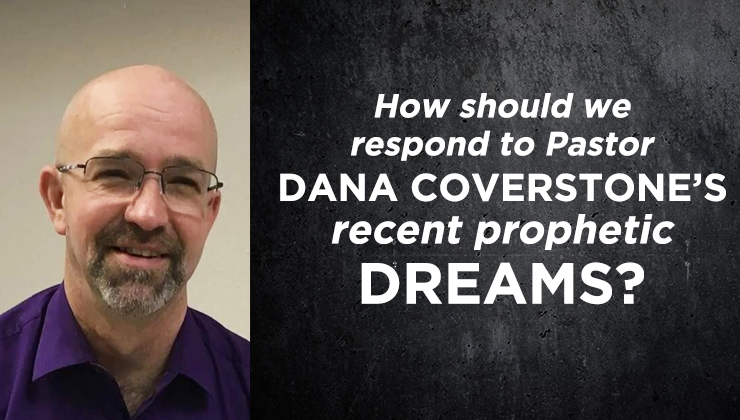Some claim that the Bible is difficult to understand. In this Little Lessons series, Bible teacher David Servant argues that the basic, most important facts of the Bible are not hard to understand at all. Learn more!


Some claim that the Bible is difficult to understand. In this Little Lessons series, Bible teacher David Servant argues that the basic, most important facts of the Bible are not hard to understand at all. Learn more!

Did you know that the Bible teaches that there is more than one future judgment we should prepare for? How can you be ready to stand before the judgement seat of Christ? How will ministers be judged? Learn more in this new Little Lesson series with Bible teacher David Servant!

Pastor Dana Coverstone has made a stir in the evangelical world after publishing several videos describing vivid, supposedly prophetic dreams he’s had about 2020 and 2021. How should we respond to these dreams? Some take them very seriously. Others have renounced them as false and dangerous. David Servant shares his views on Pastor Dana’s dreams and how he believes Christians should respond to them. Learn more!

Love is mentioned 348 times in the New American Standard Version of the Bible. 133 times in the Old Testament and 215 times in the New Testament. The Bible certainly has a lot to say about the subject of love!
Dear Friends,
This month, I’ve sensed I should republish an e-teaching I authored back in April of 2008. It is just as relevant today as it was then. It is based on clear, biblical truth, vitally important for every professing Christian to understand. It is simply about loving Jesus. It is convicting. Once you’ve read it, I encourage you to share it. Jesus said, “For whoever is ashamed of Me and My words, the Son of Man will be ashamed of him when He comes in His glory, and the glory of the Father and of the holy angels” (Luke 9:26).
May 2020 be your most fruitful year yet!
David
The greatest crisis I faced during my two decades as a pastor was not the result of a disagreeable deacon, a financial deficit, an egocentric worship leader, or a church gossip. Rather, it was due to an encounter with the Holy Spirit and God’s Word.

It all began when I read the second and third chapters of the book of Revelation, which contain Jesus’ opinion of seven churches in Asia Minor. I noticed that His opinion of some of those churches was considerably different than their opinion of themselves. The congregation at Laodicea, for example, considered themselves to be “rich” and in “need of nothing,” while He considered them to be “wretched and poor and blind and naked” (Rev. 3:17). Quite a contrast.
Jesus said, “By this all men will know that you are My disciples, if you have love for one another.” And so the outstanding characteristic of the disciple of Jesus Christ is that he or she loves the other disciples of Jesus Christ. Are you a disciple of Christ? Learn more in this Little Lessons series.

I’ve hesitated for some time to write about a Christian viewpoint of military service, war and pacifism, due to the fact that the subject is so controversial. God-seeking Christians don’t all agree on the issue. I decided, however, that this might be a good time to broach the subject since, after my previous two e-teachings, I succeeded in persuading some readers to see the contextual errors of the Anabaptist interpretation of Jesus’ Sermon on the Mount.
Christian pacifists are apt to cite Jesus’ words about loving our neighbors and enemies—both found in His most famous sermon—to support their convictions against military service and war. “How can one claim to love his neighbor or enemy and shoot bullets at him on a battlefield?” they ask. That straightforward reasoning has convinced many Christians that the military is no place for followers of Christ. Some groups and denominations even go so far as to teach that no one in military service can possibly be an authentic Christian because he so blatantly disregards Jesus’ most fundamental teaching.
So let’s begin by considering, within the context of all Scripture, the two commandments upon which Christian pacifism rests.
No doubt you’ve heard of Mennonites. Perhaps also of the Amish. Maybe even the Brethren and Hutterites. All fall under the heading of “Anabaptists,” who trace their roots to 16th century Germany and Switzerland. Their predecessors were part of what is known as the Radical Reformation, a response to perceived corruption in both Roman Catholicism and the expanding Magisterial (state-wedded) Protestant movement led by Martin Luther, John Calvin, and others.

The artist who painted this picture certainly didn’t “Get the Sermon on the Mount Right,” as Jesus and His Jewish followers would have had a little darker skin!
The early Anabaptists, like the early Christians, were pejoratively named by their persecutors, but in their case because of their distinct doctrine of re-baptizing adults who had already been baptized as babies. The word anabaptist means “one who baptizes again.” Anabaptists noticed that infant baptism, practiced by both Roman Catholics and the Protestants of their day, wasn’t found in the New Testament, and that the apostles seemed to baptize only those who were old enough to understand the gospel, repent of their sins and follow Christ.
Although not a popular subject, most Christians who lean towards a literal interpretation of the Bible’s prophetic passages believe that Scripture foretells of an unprecedented, worldwide tribulation, one that will immediately precede Christ’s return. Descriptions of that worldwide tribulation can easily be found in the Book of Revelation, many of the Major and Minor Prophets, and in the teachings of Jesus. For example, during His Olivet Discourse, speaking about the time prior to His return, Jesus said,
For then there will be a great tribulation, such as has not occurred since the beginning of the world until now, nor ever will. Unless those days had been cut short, no life would have been saved; but for the sake of the elect those days will be cut short (Matt. 24:21-22).
Today we ask, once again, how can you have a consistent and meaningful devotional life? We want to continue following up on our previous little lesson talking about a devotional life, and how is it possible to have a meaningful devotional life?
Well, it has to be heartfelt, right? You don’t just want to be saying redundant prayers by rote.